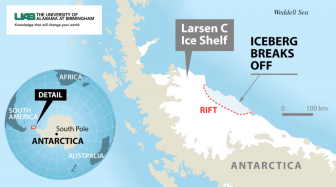The Ripple Effect When a Giant Iceberg Breaks Away From Antarctica
This week, scientists watched an iceberg the size of Delaware break away from Antarctica’s Larsen C ice shelf. The mass of ice that broke off weighs about a trillion tons. It’ll eventually melt, but as UAB polar biologist and Antarctic explorer Jim McClintock tells WBHM’s Dan Carsen, there are some long-term concerns.
Here are some highlights and an extended interview.
What Happened
“The Larsen C ice shelf just shed a piece of itself that is the size of the state of Delaware. So this is a significant chunk of real estate. The ice sheet is about 1,200 feet thick on average. The piece that broke free is now one of the largest icebergs floating around that has ever been recorded.”
The Good News
“As it melts, it will not contribute to sea level rise because it’s already in the ocean, much as a glass of ice water, when the ice melts, the water doesn’t come over the top of the glass.”
Some of the Bad News
“Ice sheets, as they break up in Antarctica, are essentially barriers to the ice that sits on top of the continent — that two- to three-mile-thick layer of ice where about 70 percent of our freshwater resides on the planet. That ice is flowing towards the ocean from land into the water, and that flow has accelerated in areas where ice sheets have broken out. That is the ice that contributes to sea level rise.”
Why it Matters
“We study chemicals produced by sponges and corals that live in Antarctica. And these chemicals are interesting because they defend sponges and corals from predators and things that want to grow on them. They have ecological importance but they also have the potential to fight human disease. And so here in the last 25 years, we’ve come across a compound in an Antarctic tunicate that’s active against melanoma skin cancer … And these changes that are happening — the warming water, the increase in icebergs that are scouring the sea floor because of the ice that is breaking up, all these things are threatening that seafloor community and have an impact on the availability of these potential compounds that fight cancer and different types of human disease.”
Birmingham is 3rd worst in the Southeast for ozone pollution, new report says
The American Lung Association's "State of the Air" report shows some metro areas in the Gulf States continue to have poor air quality.
Why haven’t Kansas and Alabama — among other holdouts — expanded access to Medicaid?
Only 10 states have not joined the federal program that expands Medicaid to people who are still in the "coverage gap" for health care
Once praised, settlement to help sickened BP oil spill workers leaves most with nearly nothing
Thousands of ordinary people who helped clean up after the 2010 BP oil spill in the Gulf of Mexico say they got sick. A court settlement was supposed to help compensate them, but it hasn’t turned out as expected.
Q&A: How harm reduction can help mitigate the opioid crisis
Maia Szalavitz discusses harm reduction's effectiveness against drug addiction, how punitive policies can hurt people who need pain medication and more.
The Gulf States Newsroom is hiring a Community Engagement Producer
The Gulf States Newsroom is seeking a curious, creative and collaborative professional to work with our regional team to build up engaged journalism efforts.
Gambling bills face uncertain future in the Alabama legislature
This year looked to be different for lottery and gambling legislation, which has fallen short for years in the Alabama legislature. But this week, with only a handful of meeting days left, competing House and Senate proposals were sent to a conference committee to work out differences.







